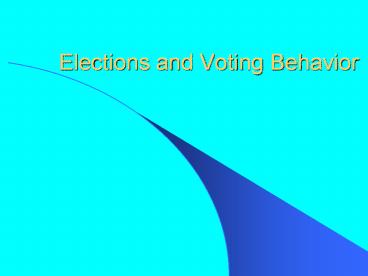Elections and Voting Behavior - PowerPoint PPT Presentation
Title:
Elections and Voting Behavior
Description:
Elections and Voting Behavior Whether to Vote: A Citizen s First Choice Deciding Whether to Vote U.S. typically has low voter turnouts. Some argue it is a rational ... – PowerPoint PPT presentation
Number of Views:189
Avg rating:3.0/5.0
Title: Elections and Voting Behavior
1
Elections and Voting Behavior
2
Whether to Vote A Citizens First Choice
- Deciding Whether to Vote
- U.S. typically has low voter turnouts.
- Some argue it is a rational choice to not vote.
- Political Efficacy The belief that ones
political participation really matters. - Civic Duty The belief the in order to support
democratic government, a citizen should always
vote.
3
Whether to Vote A Citizens First Choice
- The Decline of Turnout 1892-2004 (Figure 10.2)
4
Whether to Vote A Citizens First Choice
- Registering To Vote
- Voter Registration A system adopted by the
states that requires voters to register well in
advance of the election day. - Registration procedures differ from state to
state. - Motor Voter Act Requires states to permit people
to register to vote when the apply for their
drivers license.
5
Whether to Vote A Citizens First Choice
- Who Votes?
- Education More education more likely to vote.
Most important factor. - Age Older more likely to vote.
- Race Caucasian more likely to vote. BUT, other
ethnicities are higher with comparable education. - Gender Female more likely to vote.
6
Whether to Vote A Citizens First Choice
- Who Votes? (continued)
- Marital Status Married more likely to vote.
- Union Membership Union member more likely to
vote. - Traits are cumulative - possessing several adds
up.
7
Whether to Vote A Citizens First Choice
8
How Americans VoteExplaining Citizens Decisions
- Mandate Theory of Elections
- The idea that the winning candidate has a mandate
from the people to carry out his or her platforms
and politics. - Politicians like the theory better than political
scientists do.
9
How Americans Vote Explaining Citizen's Decisions
- Party Identification
- People generally vote for a party they agree
with. - Rise of candidate-centered politics has changed
this view. - Now many voters are individualistic.
- Characteristics of each candidate have become
more important than party.
10
How Americans Vote Explaining Citizens Decisions
11
How Americans Vote Explaining Citizen's Decisions
- Candidate Evaluations How Americans See the
Candidates - Candidates want a good visual image.
- Most important dimensions are integrity,
reliability, and competence. - Personality still plays a role.
12
How Americans Vote Explaining Citizen's Decisions
- Policy Voting
- Basing your vote choice on issue preferences.
- Must know where they and the candidates stand on
issues and see differences between candidates. - Candidates can be ambiguous on the issues.
- The press tends to focus on the horse race not
the issues. - Today candidates are forced to take a clear stand
in the party primaries.
13
The Last Battle The Electoral College
- Electoral College actually elects the President -
founders wanted him chosen by the elite of the
country - States choose the electors
- Winner-Take-All system gives bigger emphasis to
more populated states
14
The Last Battle The Electoral College
- How it works today
- Each state has as many votes as it does
Representatives and Senators. - Winner of popular vote typically gets ALL the
Electoral College votes. - Electors meet in December, votes are reported by
the vice president in January. - If no candidate gets 270 votes (a majority), the
House of Representatives votes for president,
with each state getting ONE vote.
15
The Last Battle The Electoral College
16
Understanding Elections and Voting Behavior
- Democracy and Elections
- Voters can steer government only when there are
noticeable policy differences between the
candidates. - Candidates who vow to continue popular policies
are more likely to win elections. - Policies affect voting behavior through
retrospective voting. - Bad economies make politicians nervous.































